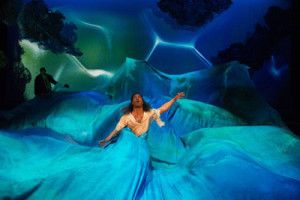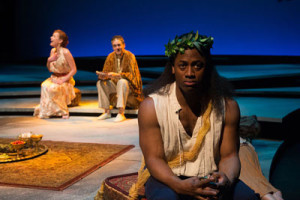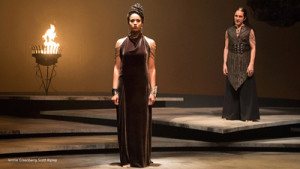Oregon Shakespeare Festival’s Pericles
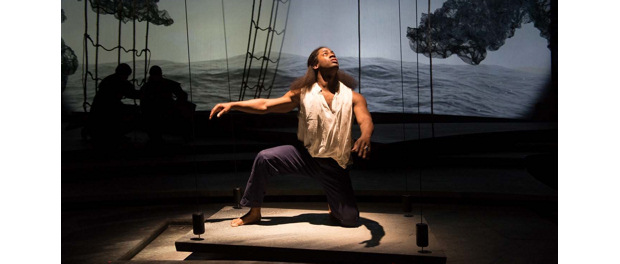 Pericles (Wayne T. Carr) at sea in OSF’s Pericles.
Pericles (Wayne T. Carr) at sea in OSF’s Pericles.
OSF’S Pericles – Theater At Its VERY BEST!
– by Lee Greene
When I saw Oregon Shakespeare Festival’s (OSF) production of Pericles in the Thomas Theatre for the first time, everything about it was SO outstanding: the profound story, performances so good by ALL the actors, theater technical arts so perfect, music that so effectively heightened the emotional impact of the piece, that it defied my expectations and shook to the core my hard-earned and years-in-the-making perceptions of what was possible on a theater stage. It was so good, I just had to see it again, if for no other reason than to make sure I hadn’t just hit a single, rare performance where everything went right but which was atypical for the run of the show. It isn’t an easy matter for me to attend more than one performance of a show, ANY show, as I have what some would call a full dance card – I see almost everything – plays, concerts, etc., in the nature of performing arts in Southern Oregon and my calendar is filled – there just aren’t very many free nights at home. Moreover, while I confess that I am privileged, as a theater critic, to be comped tickets to most of the shows I see, I bought a ($100) ticket myself to see Pericles a second time – you can call that “putting my money where my mouth is”. The second staging of Pericles that I attended was every bit as outstanding as the first one was, the performances again all extraordinary, and the technical elements all superb – the superlative quality of the first performance was no fluke – the production is just that good. Now, on to the details.
Pericles is a Jacobean (i.e., post-Elizabethan) era play, which is one of the least well known and most undervalued of the Shakespeare canon. Though Pericles was one of Shakespeare’s most popular plays with audiences in his day, it has subsequently been largely neglected, and beset with controversy over its authorship; modern collections of Shakespeare’s works usually include it in his canon, but it was not included in the First Folio of his works. Modern editors generally agree that Shakespeare is responsible for half of the play (the second half), while the first half was written by a considerably more mediocre author, most likely “victualler, panderer, dramatist and pamphleteer George Wilkins.” [Wikipedia, Pericles, https://en.wikipedia.org/wiki/Pericles,_Prince_of_Tyre]. Scholars have killed acres of trees to provide paper used to present arguments over the true authorship of the play and whether it does or doesn’t belong in collections of Shakespeare’s works. If Shakespeare DID author the play, or part of it, it is quite different and somewhat odd compared to the rest of Shakespeare’s known body of work, especially the inclusion in this work of a central, pure narrator (Gower) – a character not relating his own story or in any way involved in the plot, but like a chorus introducing each act with a prologue; purely a 3rd person observer of and commentator on the plot. It’s also structured in a more melodramatic style (plot driven and character thin) than many of Shakespeare’s best works (character driven works like Hamlet, Lear, Richard, etc.). While we too could kill some trees and expend a lot of time and effort discussing whether and to what degree Pericles is Shakespeare’s work – my position on the question is: “Who cares?” What difference does it make if the play was written by Shakespeare or someone else or some collaboration including Shakespeare? The bottom line is that it is a darn good story, a thoroughly satisfying, captivating, entertaining, heart-string tugging, storybook Romance. In the words of OSF director, Joseph Haj, “The play is a kind of allegory . . . . As Pericles suffers loss and matures through the play, the play itself deepens and thickens and becomes more dimensional. It is a profound play . . . . It’s a playwright at the top of his formidable gifts. . . . It’s a life lived.” [https://youtu.be/3prCJwmfDro] “Pericles is a playful, funny, moving, powerful meditation on what it is to be human.” [Joseph Haj’s Director Notes] Although historically, “it remains difficult to stage convincingly” [Wikipedia, Pericles, https://en.wikipedia.org/wiki/Pericles,_Prince_of_Tyre], which makes it a most unlikely candidate to produce an exemplar production of great theater – except of course, in the hands of the Oregon Shakespeare Festival.
Here’s a thumbnail summary of the plot, without the ending – if you want to know how the story ends (and you really ought to), then either (preferably) buy a ticket to the OSF production or (alternatively) read the play – trust me, the written play included in most Shakespeare collections is nowhere near as good as the OSF production, as will be explained below. The plot opens with Pericles, the Prince of Tyre in Antioch to pursue the hand of the beautiful daughter of Antiochus, the King of Antioch. Antiochus has imposed a challenge for all suitors of his daughter, who must solve a riddle or face death; but the riddle reveals that Antiochus is having an incestuous affair with his daughter and anyone who figures that out will be put to death to preserve Antiochus’ reputation. Yes, it’s a “heads he (Antiochus) wins”, “tails you lose” proposition – that’s one way to preserve a pleasurable incestuous relationship and dispatch potential competitors. Pericles solves the riddle, and since he thus knows that Antiochus is having an incestuous relationship with his daughter, Antiochus is determined to kill Pericles, who consequently flees Antioch and returns to Tyre, with Antiochus’ henchman in hot pursuit.
For self-preservation, Pericles flees Tyre, heading for Pentopolis, stopping along the way at Tarsus, a city beset by famine, which is saved by Pericles, who provides a generous gift of grain from his ship to Cleon, the governor of Tarsus and his wife, Dionyza. Pericles then continues his journey and embarks for Pentopolis. But the ship doesn’t make it – it’s wrecked by a storm and Pericles is the only survivor, washed up by the storm onto the shore of Pentopolis. There he is found by a group of poor fishermen, who explain that the King of Pentopolis, Simonedes, will be holding a tournament the next day, with the winner to receive the hand of his daughter, Thaisa, in marriage. One of the fishermen fishes Pericles’ rusty suit of armor out of the sea, and thus equipped, Pericles decides to enter the tournament. Despite his flawed equipment, Pericles wins the tournament and the hand of Thaisa, who is deeply attracted to him. Though Simonedes is initially dubious about this union, he quickly comes around, and agrees to let them marry.
Pericles and Thaisa marry and she soon becomes pregnant. Pericles receives a letter that Antiochus is dead and the people of Tyre want their prince to return to provide badly needed leadership. Pericles decides to return to Tyre with the pregnant Thaisa. Again, while enroute at sea, a storm arises and Thaisa apparently dies while giving birth to a daughter, Marina. The superstitious sailors insist that Thaisa’s body be tossed overboard to calm the storm. Pericles reluctantly agrees, and dispenses Thaisa in a waterproof casket, which washes ashore at Ephesus. Cerimon, a physician in Ephesus, discovers the casket and revives Thaisa. Thaisa believing Pericles and Marina have perished in the storm, becomes a votress (nun) in the Temple of Diana in Ephesus.
Meanwhile Pericles, fearing that infant Marina may not survive the storm, stops at Tarsus, leaving Marina in the care of Cleon and Dionyza, before proceeding on to Tyre. Marina grows up to be more beautiful than the daughter of Cleon and Dionyza, Philonen. So the envious Dionyza plots Marina’s murder. The murder is thwarted when pirates kidnap Marina and sell her to a brothel in Mytilene. Marina keeps her virginity at the brothel by convincing men they should seek virtue. Since she is ruining the brothel’s business, they dispatch her to tutor respectable young ladies and she develops a degree of fame for her musical and other proper cultural talents.
Eventually, the sullen widower, Pericles returns to Tarsus to retrieve his daughter, where Cleon and Dionyza tell him she is dead. Beset with an overwhelming grief at the loss of BOTH his wife and daughter, Pericles takes to the sea once again and isolates himself, speaking to no one. The story goes forward from there to its magical, melodramatic (e.g., extreme coincidence) conclusion.
Boy, that WAS a mouthful, wasn’t it? So, we come to OSF’s remarkable production of the play. As noted above, the play is notoriously “difficult to stage convincingly”. Much of the action takes place on the sea and involves severe storms which alter the lives and fates of the characters. Depicting all that sea action convincingly has been an obstacle to effectively staging the play for past productions. But that’s NOT an obstacle for OSF, which has mastered the necessary theatrical technical arts like no other theater company, and has at its disposal multiple techniques for representing the sea in a variety of conditions, many of which techniques were utilized for this production. Among other techniques employed were realistic background projections of an increasingly agitated and threatening sea, with downstage rigging, and a swaying ship deck (raised from the floor and suspended by cables) – which all can be seen in the lead photograph at the top of this article. The techniques were so effective that there have been reports of audience members experiencing severe sea-sickness during the storm scenes incorporating these techniques. Another technique employed to depict roiling seas, borrowed from Oriental theater, was the use of an undulating giant silk ground cloth. [See https://youtu.be/9AkfFtOPx_4] When Pericles’ ship is wrecked by stormy seas and he is tossed into the sea, a troupe of “Namigo” (“wave persons”) applies that technique to produce very effective waves, with Pericles ultimately coming up for air in the midst of that roiling sea.
ALL of the technical elements of this production are superb. The set is both a visual treat, and a practical marvel, with actors entering and exiting in all directions – traditional stage left and stage right, upstage [“Pirates!” – wait till you see it], downstage, under the stage. The lighting is exceptional – such as the use of alternating spotlights to provide shifting focus upon the actors (e.g., Pericles alternating with other characters on stage). The costumes and make-up are jaw dropping. When Antiochus’s daughter comes out to recite the deadly riddle, she turns her back to us displaying a low cut gown revealing the riddle inscribed on her beautiful exposed back. The choreography is wonderful – there’s a very amusing dance scene when Pericles is becoming acquainted with Thaisa, where Simonedes attempts to teach a two left-footed Pericles to dance, and shoves him into a room full of dancers including Thaisa, who mob him in a lively ensemble number. Eventually Pericles winds up couple dancing with Thaisa, but she clearly takes the lead and does most of the work, to the great amusement of the audience. And I haven’t even yet gotten to the two most important elements contributing to this production’s extraordinary success: the music and the acting.
If you read the play, Pericles, as it is presented in ANY collection of Shakespeare’s works, it is purely a prose piece. At some points, it does use rhyme, and meter, but Shakespeare (or whoever wrote the thing) did NOT write a musical. OSF, however has adapted Pericles as a musical. Director Joseph Haj explains: “[T]he first line of the play is ‘To sing a song that old was sung.’ . . . What if we take that at its word, and allow the play to live . . . in a musical story telling tradition. . . .” [https://youtu.be/j0QbYChvfZ0] To that end, OSF enlisted Red Clay Rambler bassist and trumpeter Jack Herrick to write original songs for this production of Pericles. Much of the story as presented on stage by OSF is sung rather than delivered in prose, and the music really dramatically improves the play, and far more effectively conveys the emotions and thoughts of the characters than the original prose does. Right from the start, Gower, rather than being simply a narrator delivering a prose monologue, becomes a troubadour, singing the introduction to his listeners. Nearly everyone sings: Pericles, Antiochus’ daughter, Thaisa, the fishermen, Marina, Bawd (the madam of the brothel), etc. The device of utilizing music works wonders. You have to see this production of Pericles, for it is unique, effective, powerful and wonderful – you can’t read Pericles this way and aren’t likely to see a comparable production anywhere else.
Last, but by no means least, the acting in this production is outstanding by the entire cast. There are 33 roles in this piece, performed by a cast of 13 (i.e., except for those playing Pericles and Gower, the actors take on 2, 3 or 4 distinctly different roles). Every OSF production seems to include a few actors at the top of their game, who deliver memorable performances. But in this production of Pericles, ALL of the cast deliver believable, polished, remarkable performances in each of their parts – what an outstanding company of actors flesh-out this play! I almost hate to single any of this cast out, for fear of unfairly and unintentionally overlooking anyone of the 13 who might not be mentioned. Yet, I just have to say something about some of these performances. Let’s start with Wayne T. Carr, who delivers an exceptional Pericles, well acted, well sung, ages perceptibly from an unpolished young man to a grizzled elder over the course of the story, thoroughly believable throughout, effectually captures our attention and sympathy, and draws us fully into the story. A tour de force performance! Then there is Brooke Parks, who is captivating as an alluring Thaisa – it’s her perfect performance that makes the amusing Thaisa scenes like the couples dance with Pericles work.
But Ms. Parks’ valuable contribution to the production doesn’t end there. She also plays the contrasting role of the nefarious Dionyza and does so remarkably – don’t miss her memorable scowling glance as she exits downstage right after a scene with Marina. Jennie Greenberry is tasked with the responsibility of representing the personification of female beauty in this production, playing both Antiochus’s daughter AND Marina, in addition to serving as a Lady at Pentapolis. She sings both of those primary parts beautifully and just radiates beauty in the roles – delivering an excellent acting turn.
Michael J. Hume fills three roles: Helicanus (acting governor of Tyre in Pericles’ absence), a well sung fisherman, and nearly steals the show as a cross-dressing well-endowed Bawd, Madam of the Mytilene brothel. Bawd’s scenes (mostly sung) with her husband Pandar (Scott Ripley – a triple threat, also playing Antiochus AND Simonides), brothel servant Boult (U. Jonathan Toppo – also a triple threat, additionally playing Thailiard – Antiochus’ servant AND one of the singing fishermen trio) and Marina are among the most amusing in the play.
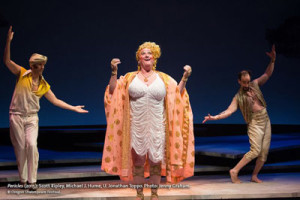
Pandar (Scott Ripley), Bawd, the brothel Madam (Michael J. Hume) and Boult (U. Jonathan Toppo) in OSF’s Pericles. Photo by Jenny Graham.
Of course, Gower the narrator (troubadour in this production) is well represented by Armando Duran. Not wanting to overlook any of the fine performances, I also tip my hat to Michael Gabriel Goodfriend (Lord of Tarsus, Lord of Pentapolis, Knight at Pentapolis AND especially notable as Lysimachus – Governor of Mytilene, in some fine scenes with Marina), Emily Serdahl (as first Marina’s nurse, Lychorida, and last as a well rendered Goddess Diana, sandwiched around a turn as a Lady at Pentapolis), Barzin Akhavan (as Cleon – Governor of Tarsus, Cerimon – the physician, AND also an amusing and notable Pirate!), Cedric Lamar (as a Lord of Tyre, another of the well sung fishermen trio, AND most memorably as Leonine, Dionyza’s appointed murderer), Zlato Rizziolli (as a Lord of Tyre AND a sailor), and Samuel L. Wick (as a sailor AND one of those unforgettable Pirates!).
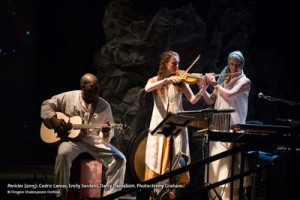
Actors Cedric Lamar plays guitar and Emily Serdahl violin, while musician par excellence Darcy Danielson plays flute for OSF’s Pericles. Photo by Jenny Graham.
One more thing: music being such a significant element of the success of this production, I have to acknowledge the musicians who did such a splendid job on this production. First and foremost, Darcy Danielson, who has been a fixture in providing music for OSF productions for as long as I can remember, simply outdid herself on this show. I lost count of all the instruments she deftly performed with, on stage (stage left) in costume in this show: keyboards, chimes, flute, ACCORDION (when the fishermen sing a jaunty and one is playing a concertina – Ms. Danielson is providing backing on the accordion), etc. Many of the actors double as musicians as well. Jennie Greenberry not only radiates beauty in her roles and sings beautifully, but contributes some beautiful cello playing too. Emily Serdahl not only delivers a triple role performance on stage, but plays musical accompaniment on the violin. Cedric Lamar not only provides a nefarious turn as the would-be murderer and does some fine singing as one of the fishermen, but he is also the concertina playing fisherman and plays the guitar on the show’s opening number, “The Tale of Pericles”. Michael Gabriel Goodfriend not only handles the 4 (FOUR!) roles applauded above, but also plays guitar on the Act II song “The Traveler” and Zlato Rizzioli supplements his two roles by playing the egg shaker. And during the entertaining dance party at Simonides’ place discussed above, triple role player U. Jonathan Toppo, memorable scene stealer Michael J. Hume, and even narrator-troubador Armando Duran all play percussion instruments. This amazing cast not only deftly handles multiple stage roles, but proficiently performs as the show’s musicians as well (you almost have to wonder whether OSF is equitably compensating them for all those contributions, divvying up and distributing what the band would be paid, if there was one).
I have to credit Director Joseph Haj for realizing his vision, and producing one of the finest pieces of theater presented anywhere at any time. Needless to say, I certainly believe I got my money’s worth, for the $100 ticket to see the show a second time, but you can purchase tickets priced lower than that for this production if your schedule is more flexible than mine. My last word on OSF’s production of Pericles is this: If you can only get to ONE of Oregon Shakespeare Festival’s fine productions this season – Pericles is THE one to see. It is exceptional, outstanding, singular, thoroughly enjoyable theater. I am a very jaded, experienced theater goer, who is not often drawn in emotionally by the productions I see, but this Pericles had me tearing up by its conclusion. It truly is “a life lived” and “a powerful meditation on what it is to be human.”
Pericles will be running in repertory in the theater through November 1, 2015. OSF is also currently running eight additional plays in repertory with Pericles: The Happiest Song Plays Last and Long Day’s Journey Into Night also in the Thomas Theatre; The Count of Monte Cristo, Head Over Heels and Antony and Cleopatra in the Allen Elizabethan Theatre; and Guys and Dolls, Much Ado About Nothing, and Secret Love In Peach Blossom Land in the Angus Bowmer Theatre. For tickets, call the OSF box office at 800-219-8161 or order online at http://bit.ly/1yqvboU.
This review was originally published by the Jacksonville Review on July 22, 2015 at http://jacksonvillereview.com/osfs-pericles-theater-at-its-very-best-by-lee-greene/
